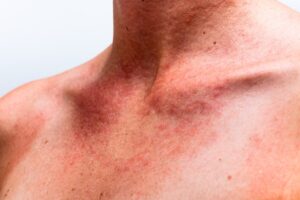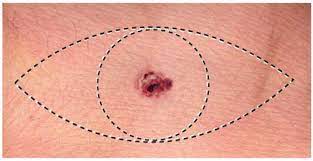Skin Cancer Treatment
 A skin cancer diagnosis is not exclusive to a select group of people. Everyone is at risk, even if you take precautions when out in the sun. Those whose families are genetically predisposed are at an increased risk of contracting skin cancer, along with people who have lighter skin tones, though darker complexions can be diagnosed too.
A skin cancer diagnosis is not exclusive to a select group of people. Everyone is at risk, even if you take precautions when out in the sun. Those whose families are genetically predisposed are at an increased risk of contracting skin cancer, along with people who have lighter skin tones, though darker complexions can be diagnosed too.
Eliminating skin cancer starts with prevention. Regular cancer screenings at Cosmetic Surgeons of Michigan, PC and everyday vigilance about the marks on your body will help keep cancers from forming; however, if you have already received a skin cancer diagnosis, there are treatment options available to keep it benign.
Our physicians practice many preventative techniques at our Michigan center for skin cancer as we believe that early diagnosis is key to your overall well being.
Do You Have Skin Cancer?
One of the best ways to keep skin cancer from forming is to perform regular examinations on your own body and check for unfamiliar lesions. Many people are born with moles, freckles and birthmarks, and others develop them as they age. It’s important to take note of the pigments on your body and ensure they remain unchanged.
Moles or marks that simply appear are cause for medical concern and should be examined by our physicians. Likewise, if you have a mole that begins to alter its appearance, this could also be a sign of skin cancer.
Types of Skin Cancer
There are three types of skin cancer that you can contract, all of which require medical attention if discovered.
Basal Cell Carcinoma (BCC)
As the mildest form of skin cancer, basal cell carcinoma is also the most common. It usually occurs due to excessive sun exposure without adequate protection, and it is easily treated when discovered; however, patients who do develop this form of skin cancer have an increased risk of contracting it again in five years, which means that regular cancer screenings are necessary to promote your health. Basal cell carcinoma resembles a red or flesh-colored bump that could be mistaken for an ulcer.
Squamous Cell Carcinoma (SCC)
This form of skin cancer is also fairly common and treatable when caught early on. Usually occurring in individuals with fairer skin, squamous cell carcinoma appears as a result of sun exposure and can develop from actinic keratosis — a pre-cancerous skin condition. The lesions tend to be smaller in size and can appear on any part of the body that the sun has had exposure to. It also closely resembles a basal cell carcinoma lesion.
Malignant Melanoma
Melanoma is the most serious form of skin cancer and is very often life-threatening if left to progress. When caught early, melanoma can be treated, which is why it is important to receive routine screenings. Melanoma usually develops from older moles on your body and becomes apparent when those moles begin to alter in shape and in color. The lesion is characterized by a dark and asymmetrical patch on the skin and requires immediate medical treatment when discovered.
What Are Your Skin Cancer Treatment Options?
Our physicians perform wide local excision (WLE) as a way to remove cancerous tumors and prevent them from spreading throughout the body. Known as one of the most effective treatments for skin cancer, wide local excision is a fairly minor surgical procedure in which a tumor or other abnormal lesion, along with some of the surrounding normal tissue, are cut out. Wide-local excision is often used for Basal Cell Carcinoma and Squamous Cell Carcinoma on the body, arms, and legs, and for early stage melanomas that have not spread beyond a thin section of skin.

Photo: FACS.org
During a wide local excision procedure, your skin care doctor begins by injecting local anesthesia into the treatment area to numb it. Then, your physician carefully removes the skin cancer and a small football-shaped section of healthy tissue around it. The amount of normal tissue that is removed depends on the thickness of the tumor being removed. The wound is then closed with stitches or sutures, and the tissue is sent off to a laboratory for analysis.
Following your skin cancer treatment, our physicians will also recommend that you practice preventative measures to keep the skin cancer from returning. Applying gracious amount of sun block and wearing clothing like hats, sun glasses and long-sleeves will keep the sun from harming the skin.
One of the most important measures you can take is to see your physician regularly for a skin examination, which will help you both keep tabs on your health and prevent cancer spots from appearing and/or spreading.
If you would like more information about how we can treat skin cancer, or if you are interested in scheduling a dermatology appointment for a skin examination, contact Cosmetic Surgeons of Michigan, PC at 586-773-6900 and schedule a consultation with our physicians.
Dermatology Services at Cosmetic Surgeons of Michigan, PC
Board certified cosmetic surgeon Dr. George T. Goffas has served patients in several locations around the metro Detroit area for over 15 years and offers a full range of various skin condition treatments. He would be happy to discuss questions you may have about skin cancer treatment, and to help you decide if Cosmetic Surgeons of Michigan, PC is the right fit for you. To schedule a personal consultation with Dr. Goffas, contact us online or call (586) 773-6900.
Areas served:
- St. Clair Shores
- Detroit
- Grosse Pointe
